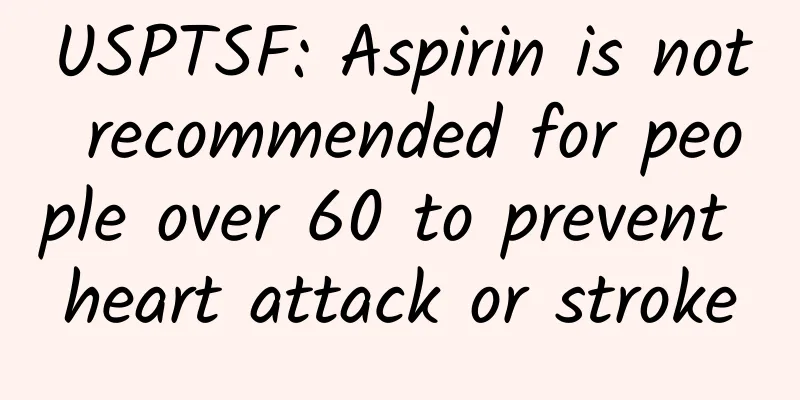USPTSF: Aspirin is not recommended for people over 60 to prevent heart attack or stroke

|
A leading U.S. expert panel has updated its health guidelines to recommend that people over 60 not take aspirin to prevent heart attacks or strokes, citing growing evidence that the harms of daily aspirin use outweigh any benefits in otherwise healthy adults. Data map Aspirin is undoubtedly a modern miracle drug. It was one of the most popular painkillers in the first half of the 20th century, and by the 1960s, it was discovered that it had incredible blood-thinning properties. Subsequent clinical trials showed that aspirin could reduce a person's risk of heart attack and stroke. This sparked the popular belief in the early 1990s that a small daily dose of aspirin could be used as a promising preventive tool for healthy adults over the age of 50. Over time, many researchers began to question this general health advice. After all, if aspirin is a blood thinner, then it must be able to increase a person's risk of a major bleeding event. This raises a classic medical dilemma – do aspirin's potential harms outweigh its benefits? Over the past decade, a growing body of research has begun to suggest that the risks of daily aspirin use in healthy adults may outweigh the benefits it provides. A major meta-study published in 2019 summarizing the results of several recent clinical trials showed that in otherwise healthy adults, the increased rates of gastrointestinal and cerebral bleeding associated with daily aspirin use outweighed the minimal benefits to heart health. Now, the U.S. Preventive Services Health Service (USPTSF), an independent panel of health experts that has provided preventive health advice to the U.S. government for more than 40 years, has officially updated its general recommendations – suggesting that people over 60 not start taking daily aspirin if they don’t have pre-existing heart health problems. The new health advice comes in two age-related tiers: a blanket recommendation against starting aspirin as a preventive tool for people over 60, and a recommendation that people aged 40 to 59 who are at high risk for cardiovascular disease (CVD) talk to their doctor about whether daily aspirin use is right for them. “People aged 40 to 59 who do not have a history of cardiovascular disease but are at higher risk may benefit from starting to take aspirin to prevent a first heart attack or stroke,” said John Wong, MD, a member of the USPTSF. “It is important that they work with their healthcare professional to decide if starting to take aspirin is right for them, as daily aspirin use does have the potential for serious harms.” For people under 60, the USPTSF recommends considering various factors before starting daily aspirin. These factors can include the patient's personal bleeding risk and their family history of cardiovascular disease. But for people over 60, the recommendations are clearer. In the absence of any pre-existing heart disease or stroke diagnosis, the potential harms of aspirin outweigh the benefits. "Based on current evidence, the task force recommends that people aged 60 and older not start taking aspirin to prevent a first heart attack or stroke," said Michael Barry, vice chair of the task force. "Because the chance of internal bleeding increases with age, the potential harms of aspirin use outweigh the benefits in this age group." Notably, the USPTSF emphasizes that those already taking aspirin should not stop any medication without consulting their doctor. There are still many adults who have legitimate clinical reasons to take a daily dose of aspirin. Instead, this new recommendation is only for healthy adults over 60 who do not have pre-existing risk factors for heart disease or stroke. From cnBeta.COM |
Recommend
Want to operate an e-commerce platform? Let’s understand these first
% ignore_pre_1 % Recently, some friends have been ...
BC Kickboxing Music + Video + Waveform
Course Catalog ├──BC Fighting Exercise 11th Video...
Is lying really related to the nose? Everyone is Pinocchio!
I believe everyone has heard of the fairy tale &q...
From 0-1, how to transform commercial product operations?
The author of this article selected several job r...
Taking Meituan Takeaway’s personal report as an example, let’s talk about user personal behavior reports!
We try to reflect the value of our product throug...
How to expand keywords in Baidu bidding account?
Users' search behaviors vary, and search tend...
Using leftover food to generate electricity! The transformation of kitchen waste
Author: Li Chuanfu Shi Xiangqi In today's wor...
Nissan Motor: Nissan China sales in August 2023 were 64,905 vehicles, a year-on-year decrease of 34.8%
According to recent news, Nissan Motor Company re...
Listen to Chen Dong’s growth story: It feels so good to have a dream come true!
At 10:44 a.m. Beijing time on June 5, 2022, the L...
Parents are addicted to mobile phones, which only brings harm, so should we confiscate their phones?
gossip "Old people's 'addiction'...
Short video information flow picture material optimization case
In recent years, disputes in the short video indu...
How to choose color contrast? Check out this list of recognized standards from major manufacturers!
I guess when you entered the design circle, you m...
Why did Xia Yiping, CEO of Jiyue Automobile, criticize Jia Yueting even though he is not a competitor?
On June 27, Xia Yiping, CEO of Jiyue Automobile, ...
The Ice Giant Arrives: A Giant Comet from the Oort Cloud
Comets are like lonely believers on a pilgrimage,...
Jiangnanhui 6.14, about the whole process of buying Douyin accounts, selecting high-quality accounts, and live streaming sales
Jiangnanhui 6.14, about the whole process of buyi...









